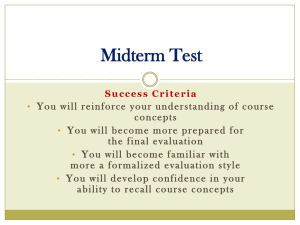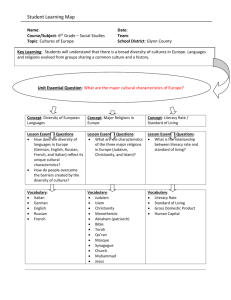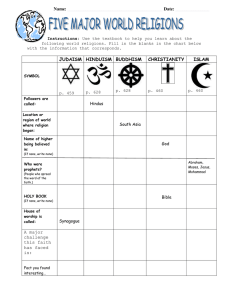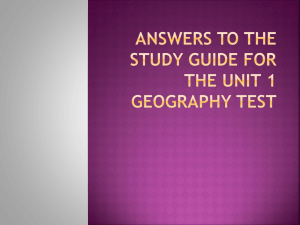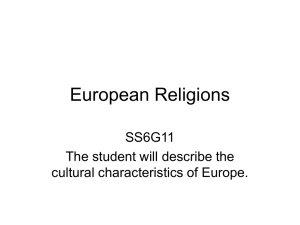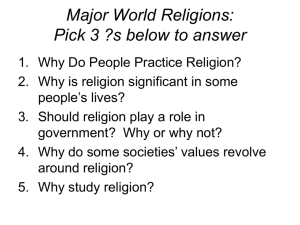Geography_of_Religion_PowerPoint
advertisement
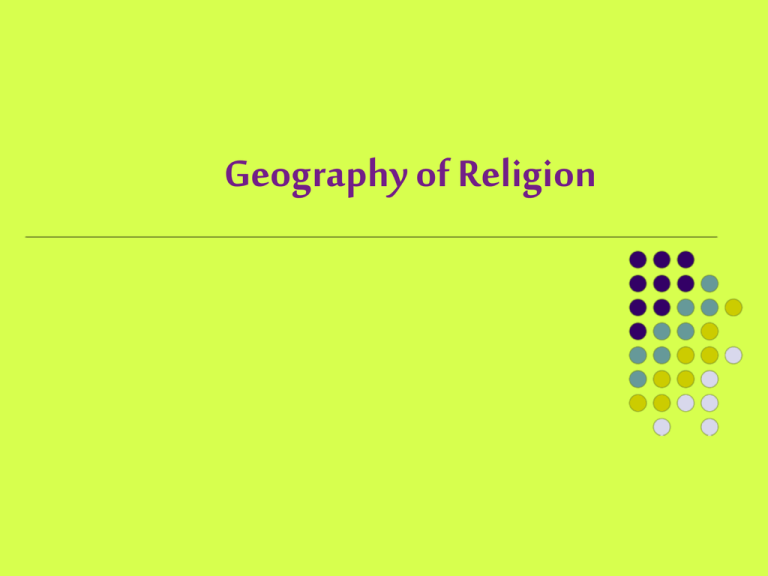
Geography of Religion Do Now • On a piece of Notebook Paper (NBP,) to be turned in, Please write a paragraph response to the following question. – Should students learn about religion? Why or why not? – You must give three reasons why you agree or disagree. – Use ONLY Complete Sentences Introduction to Religion • Religion is a belief system and a set of practices that recognizes the existence of a power higher than humans. Powerful influence on daily life. Classifying Religions • Proselytic religions actively seek new members and aim to convert all humankind. • Ethnic religions are identified with a particular ethnic or tribal group and do not seek converts. Classifying Religions • Monotheistic religions believe in only one god and may expressly forbid the worship of other gods or spirits. • Polytheistic religions believe there are many gods. Classifying Religions • Syncretic religions combine elements of multiple belief systems. • Orthodox religions emphasize purity of faith and are not open to blending with other religious ideas. • Fundamentalism is a movement to return to the founding principles of a religion. Judaism, Christianity, & Islam • All developed among the Semiticspeaking people of the deserts of the Middle East. o o o Judaism: 4,000 years ago Christianity: 2,000 years ago Islam: 1,300 years ago • Share a common hearth in southwestern Asia. Judaism • First monotheistic religion. o Belief in ONE god. • Spread widely and rapidly. • Numerically small. o Does NOT seek converts. • Holy book is called the Torah. • Widely dispersed throughout the world. • Approximately 13 million adherents. Judaism • Three major branches: • ORTHODOX: Traditionalists who observe most ceremonial laws and dietary restrictions. • CONSERVATIVE: Do not hold the importance of a Jewish political state, but emphasize the historical and religious aspects of Judaism. • REFORM: Liberal wing; culture and race oriented with little consensus on doctrinal or religious belief. • Origin and Diffusion o o o Ethnic Religion (origins of Christianity) Diaspora: In 70 A.D., Romans forced Jews to disperse throughout the world. Ghetto: During the Middle Ages, a neighborhood in a city set up by law to be inhabited only by Jews. Judaism Judaism • Basic Precepts Belief in One God Torah - original 5 chapters of Bible o Prophecy of Moses o Coming of the Messiah still to come o Atonement accomplished by sacrifices, penitence & good deeds o o • Created 1948 from a British mandate from Palestine. • Some people do not recognize its existence. • Long history of conflict with Arabs, particularly Palestinians. • Capital is Jerusalem, considered to be a holy place for Judaism, Christianity, and Islam. Jewish homeland • Monotheistic. • Evolved from Judaism. • Moved east and south of its hearth area. • Routinely spread through force. • European contact with the “New World” brought Christianity. • World’s largest religion. • Segmented into three separate churches: o o o Catholics Protestants Eastern Christians Christianity • Catholicism - largest branch o Headed by the Pope direct link to God o Ceremonial - 7 sacraments baptism, marriage, Eucharist, etc. o Very traditional Christianity • Protestantism - (1517) Reformation era o Christianity No Pope needed individual has direct link to God o Grace through faith rather than sacraments forgiveness for sins through indiv. prayers o Spread though N. Europe and England arose same time as 1466 Gutenberg Bible and the printing press Martin Luther • Eastern Orthodoxy - 5th Century split o Rivalry between Pope and Patriarch of Constantinople (Istanbul) Rome remained center for Roman Catholicism o Rejected Roman Catholicism doctrine by 1054 officially split o National Churches Russian, Greek, Serbian Orthodox, etc. Christianity • Spread in a manner similar to Christianity. o Proselytic faith. • Adherents are known as Muslims. • Worship one god, called Allah. • Founded by the prophet Muhammad. • Holy book is the Qur’an (or Koran). o Basis for sharia, or holy law. • Divided into two major groups: o Shiite & Sunni • Fastest growing world religion Islam Islam • Basic Precepts Submission to the will of God (Allah) o Lineage - Adam, Noah, Abraham, Moses, Jesus, & Mohammed (different lineage) o Holy Book - Koran - built on Old Testament o Five (5) pillars of faith o • 5 Pillars of Faith o Creed: o “There is no God but Allah” Prayer 5 times a day facing Mecca o Giving to the poor o Month of Rammadan o Pilgrimage to Mecca o Hinduism • First religion to emerge (about 4,000 years ago). • 800 million adherents. • Closely tied to Indian culture. • One supreme god: Brahman. • Many manifestations are worshipped. • Highly tolerant of other religions. • Belief in reincarnation. • Forms of worship vary regionally. Buddhism • • • • • Appeared around 500 B.C. Proselytic. Evolved from Hinduism as a reform religion. Most widespread religion in Asia. Contains several regional forms: o o Tibetan Buddhism Japanese Buddhism Buddhism • Four noble truths: • Life is full of suffering. • Desire is the cause of this suffering. • Cessation of suffering comes with the quelling of desire. • Proper conduct and meditation permits the individual to overcome desire. • Enlightenment is known as nirvana. • Individuals who achieve nirvana are known as Buddhas. Comparing Key Points: Focus on Judaism, Christianity, & Islam • ASSIGNMENTS: o 1. Comparison of Monotheistic Religions (Grid) o 2. Venn Diagram Must list at least 3 characteristics in each section. Cultural Interaction Religion & the Economy • • • • Religion can guide commerce Determine what crops are grown Foods and beverages consumed Types of employment Religious Pilgrimage • Pilgrimages are journeys to sacred places. • Particularly important to follows of Islam, Hinduism, Shintoism, and Roman Catholocism. Review Quiz Questions Your group must create 10 questions from the religion unit. Your questions should: • Vary in difficulty. You should have at least a few “easy” questions and a few “hard” questions. • Vary in type. You should ask a combination of multiple choice, true/false, and short answer questions. • Vary in content. You should cover all of the lectures and assigned readings equally. Type your questions and save them to the flash drive. Put a * next to the correct answer for each question. Label with all group members’ names. Check - Up • Write the following answers on the same page as your Do Now. • • • • 1. Define religion. 2. Identify one proselytic religion. 3. What is the most widely practiced religion in the world? 4. How does religion relate to the study of human geography?


